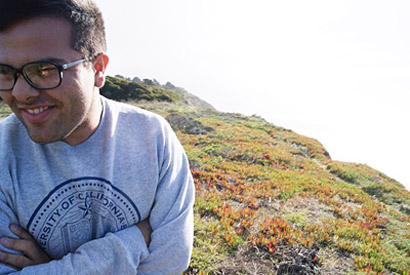Years of obstacles haven’t stopped student Marco Flores
For Marco Antonio Flores, succeeding at UC Berkeley while being undocumented was an arduous six-year journey.

December 11, 2012
For Marco Antonio Flores, succeeding at UC Berkeley while being undocumented was part of a six-year journey with drama that could be the stuff of fiction, were it not real.
At one point, he was deeply in debt and became homeless. He managed to survive homeless for at least one semester, along with another undocumented student, often subsisting on leftover food from campus events.

Marco Flores refused to let his status get in the way of his studies. (Photo by Fermin Mendoza)
Not qualifying for adequate financial aid, he couldn’t afford to register for classes. This forced him to reveal his undocumented status to professors so that he could audit courses for a semester or two before re-registering.
“As a student, I felt a need to continue my course work, even if I wasn’t officially registered,” he said. “And to be completely honest, I was always consumed by the idea that a student like myself with such passion and intellectual curiosity could not continue his studies because of my undocumented status. It was a heartbreaking reality.”
Breaking through barrier after barrier, he completed his undergraduate degree this year in the Department of Gender and Women’s Studies and went on to win the prestigious Judith Lee Stronach Baccalaureate Prize, which is allowing him to be on campus and conduct community-engaged scholarship, a status akin to a visiting scholar.
For Flores, “coming out” to his professors as undocumented was on top of another layer of identity: being gay.
In his studies, he discovered a love for research, and in 2010 he attended the Public Policy and International Affairs Junior Summer Institute at Princeton University. For the 2011-12 school year, he was selected for the Robert & Colleen Haas Scholars Program on campus and was able to do research on the experiences of queer undocumented youth. (The Haas Scholars Program was established in 1998.)
“Doing this work was an eye-opening experience, a moment of transformation in my life,” he said. “This was the start of my own transformation as a queer undocumented immigrant. I started to understand the significance of the arts and the creative process as mediums towards creating tools of transformation and healing practices for undocuqueer communities.”
Now, Flores hopes to collaborate with others to organize events on campus and in the Bay Area to showcase art and promote dialogue and activism around the experiences of young undocumented immigrants, especially those self-identified as queer. These events would be similar to gatherings called “UndocuNation” that were staged in May at the Yerba Buena Center for the Arts in San Francisco and in Charlotte, N.C., last summer, coinciding with the Democratic National Convention.